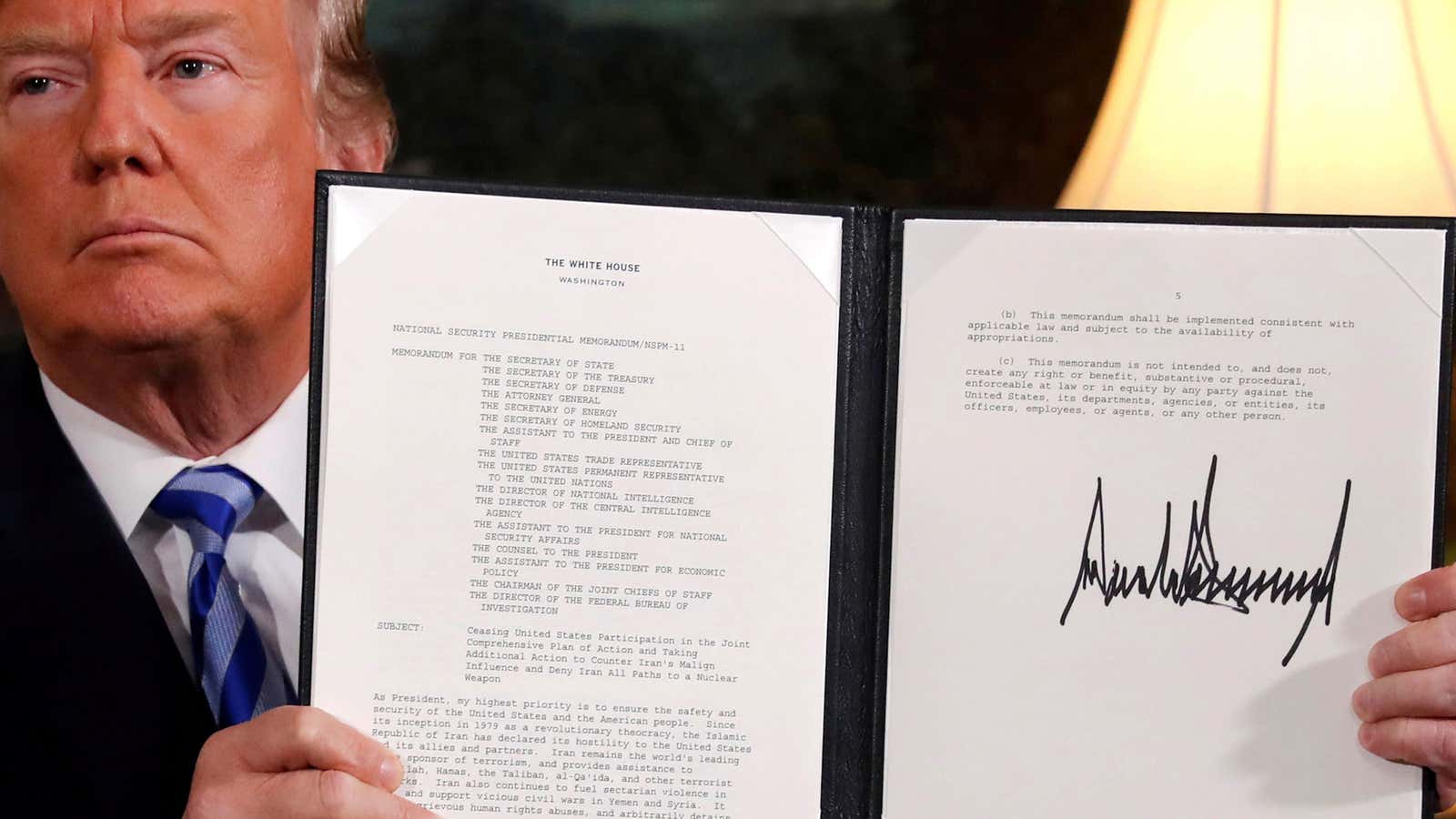The American meat industry today sent a letter to the White House, appealing directly to the president to clarify the regulatory future of high-tech, cell-cultured meats.
The letter asks Donald Trump to give the US Department of Agriculture (USDA) sole regulatory authority over a class of products that have not yet hit the consumer market: meat grown from cells in a process that doesn’t require slaughtering animals or running large-scale farms that pump massive amounts of greenhouse gas emissions into the atmosphere. The one-page document was signed by the so-called Washington, DC “barnyard,” which includes seven powerful trade groups representing the interests of an industry that contributes roughly $1 trillion to the American economy each year.
In the past few months, the USDA and US Food and Drug Administration (FDA) have engaged in a public spat over which agency should oversee the nascent industry, which in the US includes a handful of food technology startups that operate mostly out of Silicon Valley. Historically, the USDA has regulated almost all meat and poultry products. The FDA oversees fish, produce, and some specialty meats.
But the USDA primarily oversees meat and poultry at point-of-slaughter, raising an existential question for government policymakers around the world: What happens when you make meat that bypasses the need for slaughter altogether? Upstart cell-cultured meat companies say the processes they use are more akin to systems with which the FDA already has expertise, as the agency oversees biotechnology firms that use cell culturing to create many medical products.
A controversial meeting
The FDA has been adamant that it should be the agency to do the job, taking the bold step on July 12 of hosting a public meeting to discuss how future food safety and food package labeling policy might be shaped. That meeting was the first time cell-cultured meat companies, traditional meat groups, health advocates, animal welfare activists, and government officials convened in the same room to discuss the topic. The FDA commissioner himself, Scott Gottlieb, made an appearance, to deliver opening remarks.
But meat groups took umbrage at the FDA’s seemingly unilateral action, and are now for the first time asking as a unified chorus that the USDA be assigned oversight power. The groups include the National Cattlemen’s Beef Association, National Pork Producers Council, National Chicken Council, National Turkey Federation, the American Sheep Industry Association, the American Farm Bureau Federation, and the North American Meat Institute.
“If cell-cultured protein companies want the privilege of marketing their products as meat and poultry products to the American public, in order to ensure a fair and competitive marketplace, they should be happy to follow the same rules as everyone else,” the letter states.
That the letter describes the new startups as producers of “protein” hints at of why cell-cultured meat companies are leery of USDA getting oversight authority for their industry. They fear regulation by the agency would put them at a disadvantage to established meat groups, which have built up political clout within the USDA. Public comments about the new industry suggest that many in the meat industry despise the fact that the startups call their products “meat” at all. Some groups have in the past publicly referred to cell-cultured meats as “fake meat.” Among the startups themselves, many call cell-cultured products “clean meat,” which also has upset meat producers who say it implies their own products are inherently dirty.
Seizing a political moment
The timing of the letter comes at an interesting moment for the president, whose escalating trade wars with major trading partners like Canada, Mexico, China, and the European Union have already cost the US agriculture sector billions of dollars, according to the National Farmers Union. Those losses have riled farmers across rural America, people the president has counted among his base of supporters. For that reason, the White House this week (July 25) announced it would use a 1930s-era policy to offer the agricultural industry a $12 billion bailout to help make up for the negative impact of the president’s trade policies.
If the president is sensitive to the complaints of his agricultural base, it is conceivable that he could use the regulatory debate around cell-cultured meat as a political lever to pull in favor of angry farm groups. He would have the support of some members of Congress, who in early July signed onto a letter by the House Agriculture Committee that was sent to the White House, asking it to mandate that the USDA be included in any future discussions about cell-cultured meat oversight.
Whatever happens, the companies behind high-tech meats stand ready to “play with whatever cards they are dealt,” says Bruce Friedrich, who leads the Good Food Institute, a group that supports and lobbies on behalf of the cell-cultured meat industry.
“The fact is the products are safe and there is a profit motive for the meat industry to shift over to this much more efficient new means of production,” Friedrich says, alluding to investments big meat companies have already put into the new technology.
Last week in Boston, the non-profit group New Harvest, which supports research in the field of cellular agriculture, held a two-day conference where future food regulation was a hot topic. One of the speakers was Eric Schulze, a senior scientist at the Berkeley-based cell-cultured meat company Memphis Meats.
“This is just the beginning of what is sure to be—and should be—a very thorough conversation about our products,” Schulze said. “It will take an investment on our part. An investment in our time and patience and continuing to place a high priority on transparency.”
